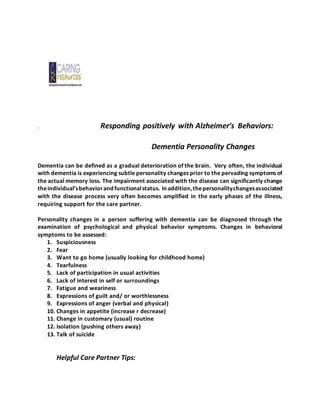Responding positively with alzheimer
Dementia causes personality changes and deterioration of brain function over time. Early symptoms often involve subtle personality alterations before memory loss occurs. The disease process amplifies personality changes and impacts behavior and daily living. Personality changes in dementia can be assessed through examination of 13 psychological and physical symptoms, including suspiciousness, fear, lack of interest, and changes in routine or appetite. Care partners are advised to understand changes are due to brain changes, assess triggers for behaviors, and address behaviors calmly through redirection, comfort, and ensuring safety rather than restraint. Caring Resources provides training to help care partners effectively support clients through exceptional care.

Recommandé
Recommandé
Contenu connexe
Tendances
Tendances (18)
En vedette
En vedette (9)
Similaire à Responding positively with alzheimer
Similaire à Responding positively with alzheimer (20)
Plus de Claire Henry, M.Ed.,CDP
Plus de Claire Henry, M.Ed.,CDP (20)
Responding positively with alzheimer
- 1. . Responding positively with Alzheimer’s Behaviors: Dementia Personality Changes Dementia can be defined as a gradual deterioration of the brain. Very often, the individual with dementia is experiencing subtle personality changes prior to the pervading symptoms of the actual memory loss. The impairment associated with the disease can significantly change theindividual’sbehaviorandfunctionalstatus. Inaddition,thepersonalitychangesassociated with the disease process very often becomes amplified in the early phases of the illness, requiring support for the care partner. Personality changes in a person suffering with dementia can be diagnosed through the examination of psychological and physical behavior symptoms. Changes in behavioral symptoms to be assessed: 1. Suspiciousness 2. Fear 3. Want to go home (usually looking for childhood home) 4. Tearfulness 5. Lack of participation in usual activities 6. Lack of interest in self or surroundings 7. Fatigue and weariness 8. Expressions of guilt and/ or worthlessness 9. Expressions of anger (verbal and physical) 10. Changes in appetite (increase r decrease) 11. Change in customary (usual) routine 12. Isolation (pushing others away) 13. Talk of suicide Helpful Care Partner Tips:
- 2. ~Assist the Care Partner with acceptance that personality changes are result of changes occurring in the brain. ~Assess triggersto behavior, including theindividual’sneed for safety and security, self-worth and dignity. Behavioral Approaches: ~Suspicious Behavior: use calm, reassuring approach. Understand the individual’s reality and inability to recognize objects and familiar people. ~Hallucinations:Do not attempt to reason with client. Comfort fearswithin quiet environment. May need intervention from medical personnel. ~Catastrophic Reactions:Not recommended to restrain, remove source of stress, redirect to calmer environment. Assess for safety and emergency medical interventions. ~Wandering, pacing, shadowing care partner: assess for environment or behavioral triggers. Behavior triggerssuch as, “Is the client looking for the bathroom, are they experiencing pain”? ~Sundowning Behaviors:afternoon agitation, assess for behavior triggers. Behavior triggers such as “Does the client need a nap? Assess environmental lighting? Is there sleep disturbance? Caring Resourcesiscommittedtoprovidingprofessionalcarepartnerswith the necessary skills and resources to enable them to provide exceptional care to their clients. Our training and educational modules are geared to professionals working in both community-based and residential care settings. For more informationcontact arepresentative at 781-540-1526.
